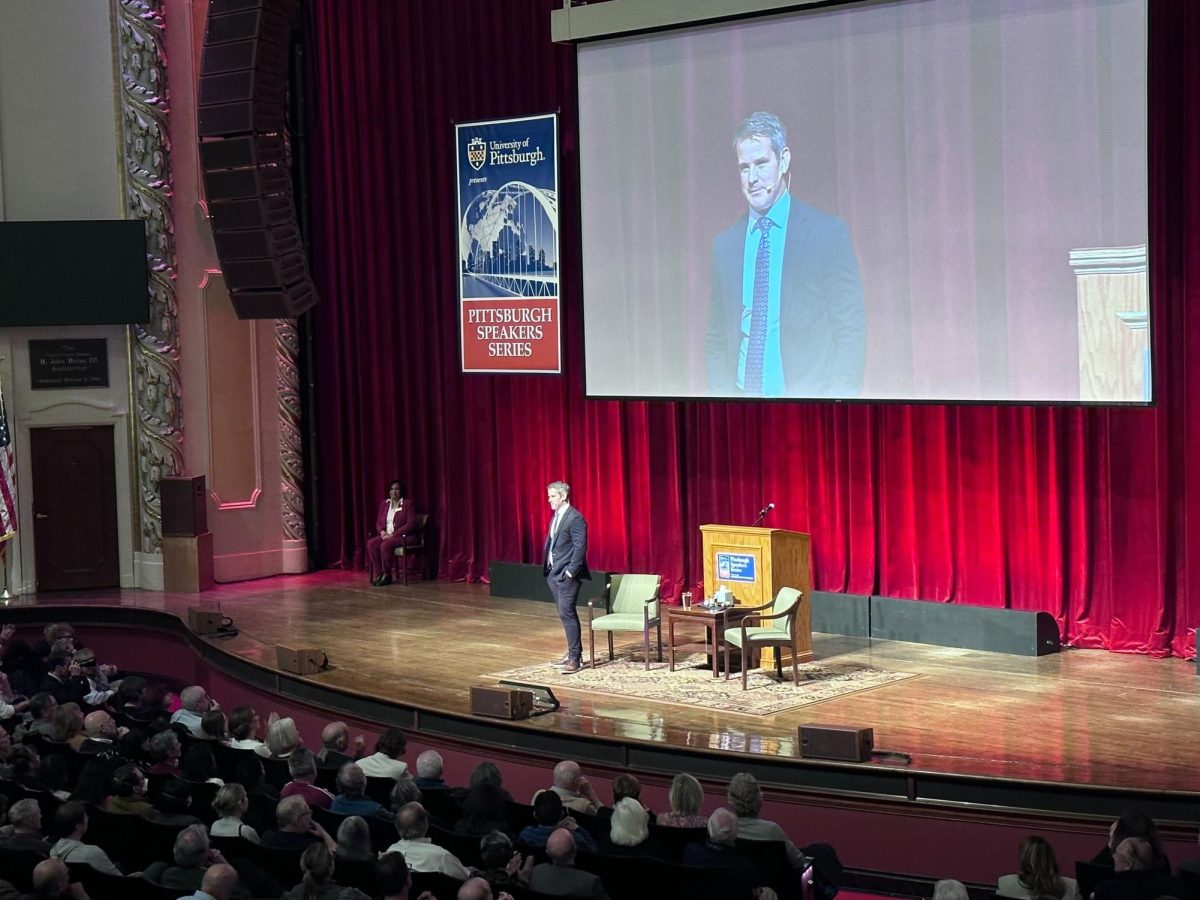On the stage of Heinz Hall, former Rep. Adam Kinzinger said he never wanted to be one of the two Republicans who served on the House committee to investigate the Jan. 6 Capitol attack.
“I didn’t want to, but there’s one thing I knew,” Kinzinger said, stifling the emotion in his voice. “I knew that I could never teach my kid … that he should do the tough thing — that he should sometimes put his own self-interest behind if I was unwilling to do the same thing.”
The former congressman delivered a speech to a packed audience at Heinz Hall in downtown Pittsburgh on Wednesday afternoon. The event was part of the University’s Pittsburgh Speaker Series, which hosted talks with actress Jane Fonda and CNN host Van Jones last month. Kinzinger’s lecture ranged from his congressional tenure to Trump, foreign policy, the military and Thanksgiving.
Kinzinger, a former Republican congressman, represented Illinois in the House of Representatives from 2011 to 2023. He gained prominence in national politics after breaking with his party in the wake of the 2020 election, publicly criticizing former President Donald Trump’s attempts to subvert the election results. Kinzinger was one of 10 Republicans who voted to impeach Trump in his second impeachment trial after Jan. 6, later serving on the House Jan. 6 investigative committee. He declined to run for re-election in 2022.
Ditching the podium, Kinzinger paced the stage and spoke for over an hour before a moderated Q&A session with KDKA radio host Larry Richert. Kinzinger said it’s imperative that the United States rebuild public trust in democratic institutions.
“We know that in the last few years there’s been this effort to undermine faith in the election system, and faith in each other and faith in democracy. I want to tell you when that faith goes away … I don’t know how you recover from that,” Kinzinger said. “That’s why I think it is so essential for us right now to take inventory of that and figure out what we need to do to restore that faith in each other, and to restore that faith in our democracy.”
Kinzinger left local office in 2003 to join the Air Force and serve in Iraq and Afghanistan. He said he reflected on his military service during his tenure as a representative, including his decision to speak out against Trump.
“If I’m gonna have a position where I’m taking votes that are going to send people to war, that are going to send people to their death … if somebody’s willing to put their life on the line for their country, I have to be willing to put my job on the line for the country,” Kinzinger said.
Kinzinger broke with traditional Republican viewpoints several times throughout the lecture, including calling for the abolition of the Electoral College, saying lawmakers must limit the political influence of billionaires to stop the U.S. from becoming an “oligarchy” and encouraging Republican audience members to vote for Joe Biden in 2024.
“I think there is one issue on the ballot in 2024 … Do you support democracy, or do you support authoritarianism?” Kinzinger said. “If [democracy] doesn’t survive, you’re gonna yearn for the day that you were outraged at the Biden administration.”
Kinzinger said he received significant backlash after his decision to criticize Trump, including from his own family.
“A certified letter showed up in the mail from my dad’s cousins … it says, ‘Oh my, what a disappointment you are to us and to God,’” Kinzinger said. “I got disowned by half of my family because of what I did. They’re not gonna be at my Thanksgiving. Maybe it’s good to avoid politics this Thanksgiving.”
In the lobby of Heinz Hall before Kinzinger’s speech, Pitt student William Goetzman said the former congressman represented a model for bipartisanship.
“Kinzinger is a great example of someone who crossed party lines to try to lend some legitimacy [to] the investigation of Jan. 6, and I think that was a really brave thing to do,” Goetzman, a first-year political science and economics major, said. “That had a big cost to him personally. So I think there’s definitely a place for Republicans who want to place the institutions of the nation above their own party.”
After the talk, Caleb Buzard, a junior politics and philosophy major, said he respected Kinzinger from across the aisle.
“It’s important for people who may disagree on policy to agree on one thing, which is that our democracy is paramount to all else,” Buzard said. “The things that we’ve cherished as a country and as a culture for 250 years transcend all political differences. As a Democrat, that’s something Congressman Kinzinger and I agree on.”
Kinzinger first held public office at age 20. At the lecture’s reception, Kinzinger told The Pitt News that college students considering running for office should follow their passions.
“The key is do whatever you love, but look for the right opportunity. Don’t live your life to try to find that, because you never know when it’s gonna come. Chase the other thing you love, and when you find that opportunity, don’t be afraid to fail,” Kinzinger said. “Always do what you think is right. If you believe it, people will see your energy, and they’ll believe it with you.”


